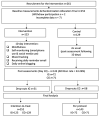Mind over Matter: Testing the Efficacy of an Online Randomized Controlled Trial to Reduce Distraction from Smartphone Use
- PMID: 32635650
- PMCID: PMC7369880
- DOI: 10.3390/ijerph17134842
Mind over Matter: Testing the Efficacy of an Online Randomized Controlled Trial to Reduce Distraction from Smartphone Use
Abstract
Evidence suggests a growing call for the prevention of excessive smartphone and social media use and the ensuing distraction that arises affecting academic achievement and productivity. A ten-day online randomized controlled trial with the use of smartphone apps, engaging participants in mindfulness exercises, self-monitoring and mood tracking, was implemented amongst UK university students (n = 143). Participants were asked to complete online pre- and post-intervention assessments. Results indicated high effect sizes in reduction of smartphone distraction and improvement scores on a number of self-reported secondary psychological outcomes. The intervention was not effective in reducing habitual behaviours, nomophobia, or time spent on social media. Mediation analyses demonstrated that: (i) emotional self-awareness but not mindful attention mediated the relationship between intervention effects and smartphone distraction, and (ii) online vigilance mediated the relationship between smartphone distraction and problematic social media use. The present study provides preliminary evidence of the efficacy of an intervention for decreased smartphone distraction and highlights psychological processes involved in this emergent phenomenon in the smartphone literature. Online interventions may serve as complementary strategies to reduce distraction levels and promote insight into online engagement. More research is required to elucidate the mechanisms of digital distraction and assess its implications in problematic use.
Keywords: distraction; intervention; randomized controlled trial; smartphones; social media; social media addiction.
Conflict of interest statement
The authors declare no conflict of interest.
Figures
Similar articles
-
Exploring the Dimensions of Smartphone Distraction: Development, Validation, Measurement Invariance, and Latent Mean Differences of the Smartphone Distraction Scale (SDS).Front Psychiatry. 2021 Mar 8;12:642634. doi: 10.3389/fpsyt.2021.642634. eCollection 2021. Front Psychiatry. 2021. PMID: 33762981 Free PMC article.
-
Emotional and Behavioural Factors Predisposing to Internet Addiction: The Smartphone Distraction among Italian High School Students.Int J Environ Res Public Health. 2024 Mar 22;21(4):386. doi: 10.3390/ijerph21040386. Int J Environ Res Public Health. 2024. PMID: 38673299 Free PMC article.
-
Problematic use of the internet, smartphones, and social media among medical students and relationship with depression: An exploratory study.PLoS One. 2023 May 26;18(5):e0286424. doi: 10.1371/journal.pone.0286424. eCollection 2023. PLoS One. 2023. PMID: 37235547 Free PMC article.
-
Behavioural modification interventions for medically unexplained symptoms in primary care: systematic reviews and economic evaluation.Health Technol Assess. 2020 Sep;24(46):1-490. doi: 10.3310/hta24460. Health Technol Assess. 2020. PMID: 32975190 Free PMC article.
-
Addictive Features of Social Media/Messenger Platforms and Freemium Games against the Background of Psychological and Economic Theories.Int J Environ Res Public Health. 2019 Jul 23;16(14):2612. doi: 10.3390/ijerph16142612. Int J Environ Res Public Health. 2019. PMID: 31340426 Free PMC article. Review.
Cited by
-
Digital Dependence in Organizations: Impacts on the Physical and Mental Health of Employees.Clin Pract Epidemiol Ment Health. 2023 Jan 25;19:e174501792212300. doi: 10.2174/17450179-v19-e230109-2022-17. eCollection 2023. Clin Pract Epidemiol Ment Health. 2023. PMID: 37275437 Free PMC article.
-
Emerging Health and Education Issues Related to Internet Technologies and Addictive Problems.Int J Environ Res Public Health. 2021 Jan 4;18(1):321. doi: 10.3390/ijerph18010321. Int J Environ Res Public Health. 2021. PMID: 33406806 Free PMC article. Review.
-
Problematic use of the internet during the COVID-19 pandemic: Good practices and mental health recommendations.Compr Psychiatry. 2022 Jan;112:152279. doi: 10.1016/j.comppsych.2021.152279. Epub 2021 Oct 20. Compr Psychiatry. 2022. PMID: 34700188 Free PMC article. Review.
-
Causal effects of social media use on self-esteem, mindfulness, sleep and emotional well-being: a social media restriction study.Front Public Health. 2025 May 30;13:1548504. doi: 10.3389/fpubh.2025.1548504. eCollection 2025. Front Public Health. 2025. PMID: 40520283 Free PMC article. Clinical Trial.
-
Exploring the Dimensions of Smartphone Distraction: Development, Validation, Measurement Invariance, and Latent Mean Differences of the Smartphone Distraction Scale (SDS).Front Psychiatry. 2021 Mar 8;12:642634. doi: 10.3389/fpsyt.2021.642634. eCollection 2021. Front Psychiatry. 2021. PMID: 33762981 Free PMC article.
References
-
- Atchley P., Lane S. Psychology of Learning and Motivation. Elsevier; Amsterdam, The Netherlands: 2014. [(accessed on 11 June 2019)]. Cognition in the attention economy; pp. 133–177. Available online: https://linkinghub.elsevier.com/retrieve/pii/B9780128002834000046.
-
- Falkinger J. Attention economies. J. Econ. Theory. 2007;133:266–294. doi: 10.1016/j.jet.2005.12.001. - DOI
-
- Lee A.R., Son S.-M., Kim K.K. Information and communication technology overload and social networking service fatigue: A stress perspective. Comput. Hum. Behav. 2016;55:51–61. doi: 10.1016/j.chb.2015.08.011. - DOI
Publication types
MeSH terms
LinkOut - more resources
Full Text Sources
Miscellaneous



